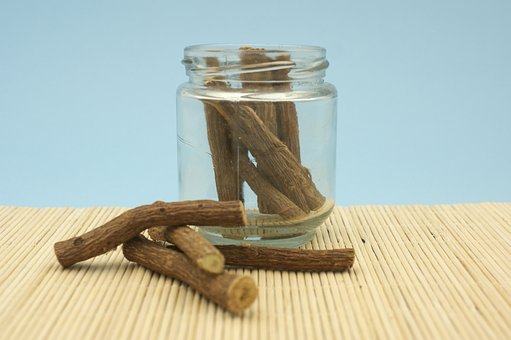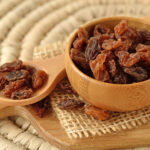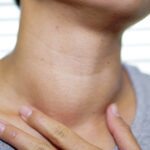Friday, February 17, 2023
Licorice is used as a treatment for many health problems, as it contains many antioxidant and anti-inflammatory compounds that make it a multi-benefit plant. However, excessive use of licorice root can cause some side effects, which you will learn about in this article.
What is licorice?
Licorice is an herb that grows in parts of Europe and Asia. The root of licorice contains many compounds, including glycerrizin, which is one of its main components, and is responsible for its sweet taste, in addition to its antioxidant and anti-inflammatory properties. This makes it generally safe to use for many health problems, however it can cause side effects when taken in excess.
An overview of the plant and its use in traditional medicine
Licorice root has been used since ancient times in traditional medicine to treat many digestive disorders including stomach ulcers, flatulence and colic, menopausal symptoms, and respiratory disorders such as cough, asthma, tonsillitis, sore throat, and fever. Licorice is also used for topical use by applying it to the skin.
Licorice nutritional value
Licorice contains many nutritional benefits, as 100 grams of licorice contain the following nutritional value:
| Nutrients | Nutritional value |
| water | 6.30 ml |
| energy | 375 calories |
| sugars | 70 gr |
| Calcium | 3 mg |
| copper | 0.2 mg |
| Iron | 0.1 mg |
| magnesium | 2 mg |
| Sodium | 50 mg |
| Fats | 0.1 gr |
| carbohydrates | 55.93 gr |
| protein | 0 gr |
Benefits of licorice
Benefits of licorice for men
showed some studies Licorice has many benefits for men, as it helps treat erectile dysfunction problems, and it also has beneficial effects on male hormone levels. However, she pointed out Other studies That licorice root reduces testosterone levels in the blood in men, so it is important to consult a doctor before using it.
Benefits of licorice for hair
Licorice can be a good remedy that helps treat hair loss and stimulate its growth by creating a tingling effect on the scalp, which stimulates blood flow to the scalp and helps hair growth.
Licorice also has soothing properties for dry, oily or irritated scalps. It is effective in treating scalp irritations that cause dandruff or itchy scalp. Its soothing properties can help unclog and cleanse pores, and licorice keeps the scalp moisturized for healthier hair growth.
If you have chemically treated your hair, your hair is likely to be dry or damaged due to harsh chemicals found in hair dye or styling products. Licorice can be used to moisturize the scalp and preserve the natural oils of the hair.
Benefits of licorice for the body
The compounds in licorice can help reduce inflammation and treat some skin conditions including eczema symptoms, reduce swelling and pain, itchy skin sores, and some types of fungal infections.
Benefits of licorice for the colon and stomach
Licorice root helps soothe inflamed or infected mucous membranes in the digestive tract. It may also protect against diseases of the stomach and duodenum (the first part of the small intestine that connects to the stomach) by increasing the production of mucin, a substance that protects the lining of these organs from stomach acid. and other harmful substances. In addition to preventing irritable bowel cancer and relieving indigestion disorders, including stomach ulcers, it also reduces menstrual cramps in women.
Benefits of licorice for the respiratory system
Due to its antimicrobial and anti-inflammatory properties, licorice tea or lotion may help relieve respiratory conditions, including symptoms of: asthmaespecially in recent cases of asthma, and prevents sore throat, and prevents sore throat After surgery, bronchitis.
Benefits of licorice for teeth
Several studies show that licorice reduces the growth of bacteria that cause tooth decay and helps treat other oral diseases, including gingivitis. oral candidiasis, Because licorice root contains two essential compounds in the treatment of oral diseases, licoricidin and licorisoflavan A.
It is also known to naturally freshen breath, reducing the problem of bad breath.
Also read: All you need to know about bad breath and ways to treat it!
Benefits of licorice for the skin
Licorice root contains 300 compounds that are antibacterial, anti-inflammatory and antiviral, which helps in treating acne. It can also help in renewing the secretion of collagen and elastin in the skin, which maintain skin elasticity and smoothness. Not only that, licorice also works to maintain hyaluronic acid. , which gives the skin a healthy look.
Licorice extract fights excess melanin production, due to its formula that removes dark spots and treats hyperpigmentation, giving you a uniform skin tone, in addition to containing licorisoflavan A, which increases the production of antioxidants in the skin, which protects against skin damage caused about sunlight.
Ways to use licorice
Licorice is available in many cosmetic formulations, chewable food supplements, capsules, or herbal powder. It can be used in the following ways:
- Mix licorice with a mild gel such as aloe vera and apply it to the skin to help relieve the symptoms of eczema.
- Soak it with herbs in hot water to prepare herbal tea that treats sore throat.
- Use of licorice extract to treat mouth ulcers.
It is important to consult a doctor before taking licorice supplements, to determine the appropriate dose for each case.
Licorice damage and side effects
In general, licorice is considered safe for adults, but its excessive consumption carries many risks, including low potassium levels, which can lead to:
- Hypertension
- Arrhythmia
- swelling
- lethargy
Licorice can cause an allergic reaction when mixed with other ingredients and applied to the skin, and its consumption during pregnancy increases the risk of premature birth or neurological deficit.
Frequently Asked Questions:
Is licorice placed under the eye?
Licorice is characterized by its ability to treat dark circles because it contains vitamin K, which works to unify the skin color and adjust the melanin content in the skin. Licorice extract can be used in the form of compresses in the dark circles area.
Does licorice remove pigmentation?
The antioxidant-rich components of licorice in the licorice plant can help protect the skin, lighten dark spots on the skin and treat uneven skin tone, which helps in achieving a healthy complexion.
Also read: Dark spots on the skin.. their causes and methods of treatment!











